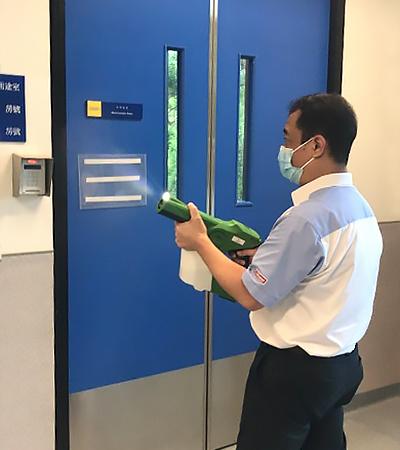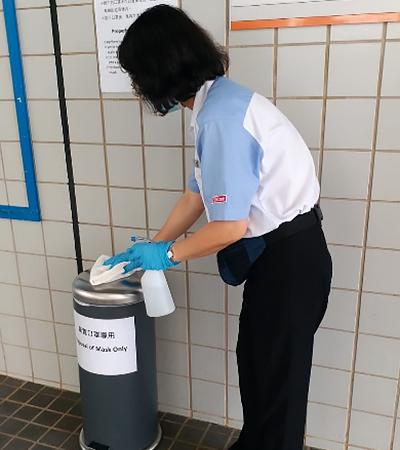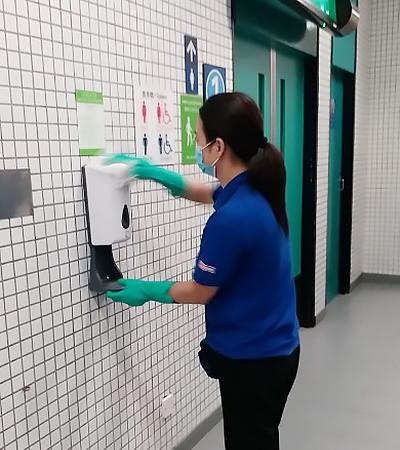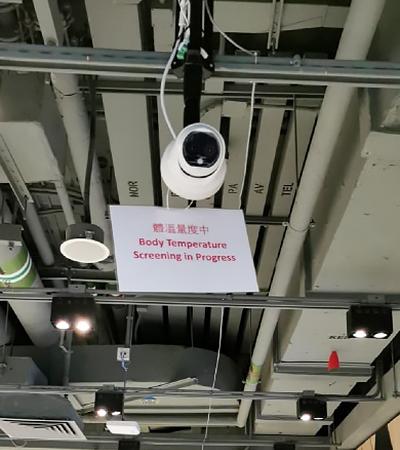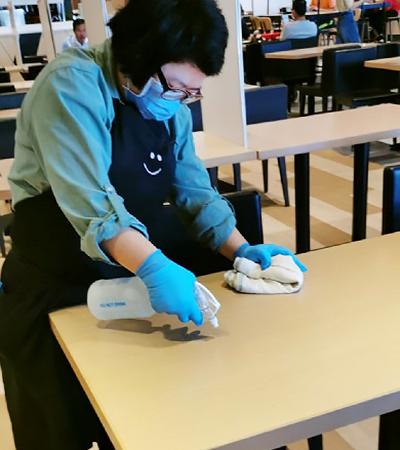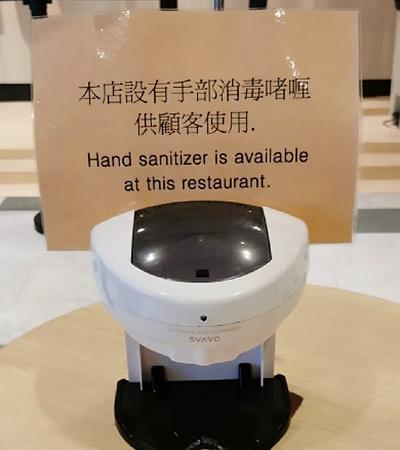Public Health
Unsung Heroes During COVID-19
Every member of the campus community has taken part in our collective fight against the COVID-19 pandemic in the past year. The extra efforts of colleagues with duties in managing campus health and safety, security, facility operations, plus researchers who apply their research findings to fight the pandemic are probably more visible to the campus community during this period. However, Safetywise would like to pay special tribute to our healthcare providers, IT professionals and frontline workers who have also worked through difficult conditions and overcome substantial challenges during COVID-19 times.
We owe these unsung heroes a deep debt of gratitude for the efforts and sacrifices they have made in safeguarding our campus, and making sure critical operations can continue under the pandemic.
- Campus Medical Clinic;
- CLS;
- ITSC;
- ISO;
- the COVID-19 Info @HKUST team;
- cleaners; and
- catering outlet workers.
Interviewees: Doctors and nurses Campus Medical Clinic, Health Concepts Limited, Virtus Group.
“We have made every effort to maintain normal services during the COVID-19 pandemic. The campus medical clinic remains open at normal hours,” said the doctors. “While the pandemic situation in Hong Kong remains unstable, please stay vigilant and continue to observe the preventive measures when visiting the clinic,” they added.
- All patients are advised to put on a surgical mask when visiting the clinic and fill out a questionnaire regarding his/her symptoms and travel/contact history. It is important for the patients to provide true information in the questionnaire to enable the clinic to handle patients with symptoms appropriately and identify those needing priority for consultation;
- All patients will be screened with a forehead Infrared thermometer upon entering the triage area at the indoor entrance of the clinic; and
- Fever patients will be consulted in a room with separate ventilation or will be asked to wait at a semi-outdoor area at the balcony outside the LG1 S H Ho Sports Hall.
“As healthcare professionals in the campus medical clinic, we are committed to protect the health of all members of the university and response to changes,” said the nurses.
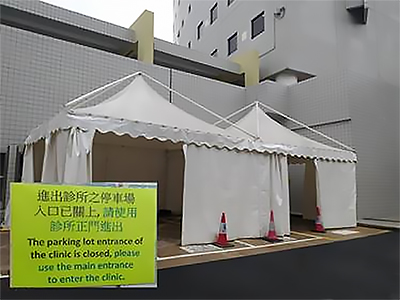
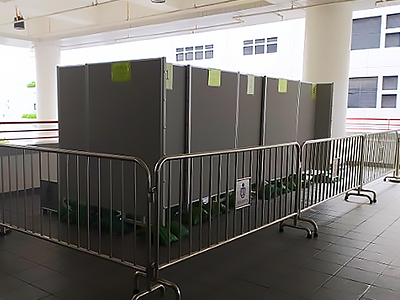
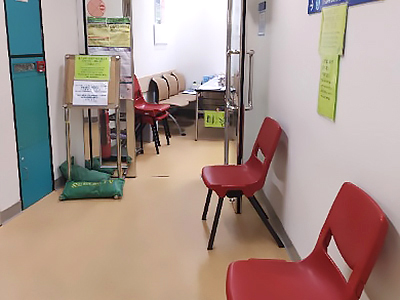
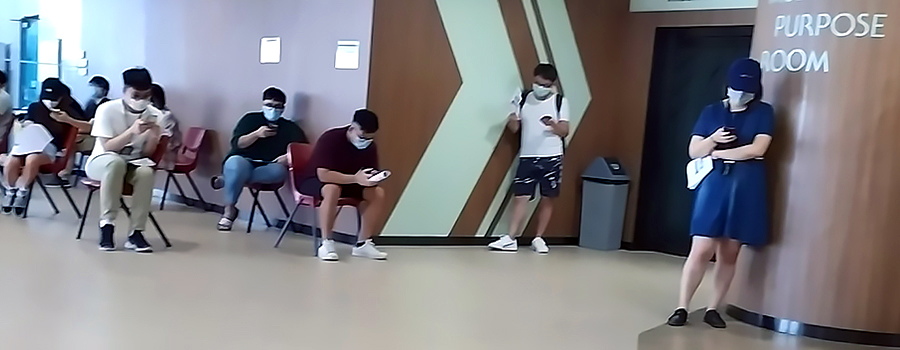
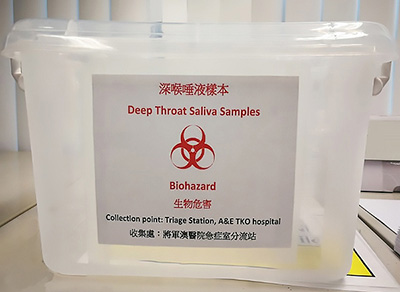
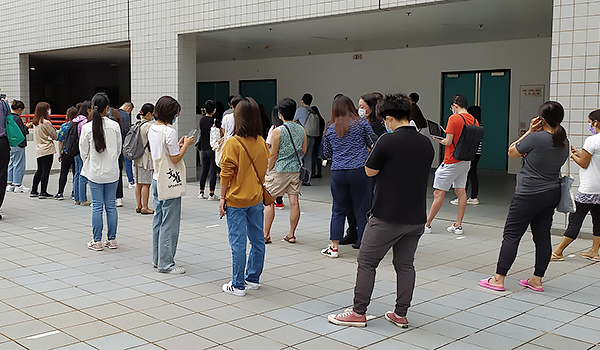
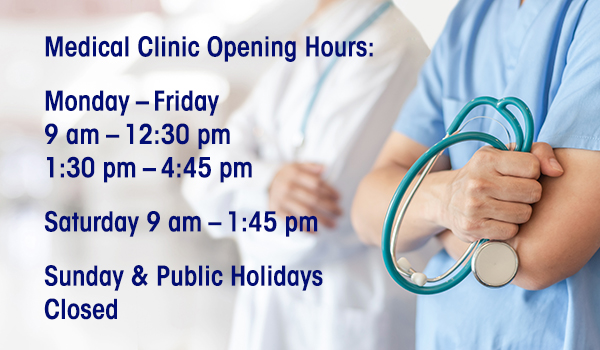
In January 2020, a couple of marquees were set up at the LG1 outdoor carpark to conduct temperature screening and triage of all patients visiting the campus medical clinic. These marquees facilitated distancing between patients and ensured effective ventilation to fresh air. The temporary marquees were then removed in May when the tropical cyclone and rainstorm season in Hong Kong approached. The triage area has been re-located to the normal indoor entrance of the campus medical clinic at LG1 room 1020 to 1024.
In early July, a research assistant living off campus was tested positive for COVID-19 test. 176 staff and students worked at or near the research assistant’s laboratory or office have been tested and all were found to be negative for COVID-19. In early August, subsequent to an infected contract security guard who worked at Global Graduate Tower (GGT) and Stephen Kam Chuen Cheong (SKCC) Hall, 68 students residing in SKCC Hall and 12 staff who worked at SKCC Hall or GGT have been tested for COVID-19 and all were found to be negative.
The annual Influenza Awareness Campaign was held in mid-October 2020 but the demand on vaccine has been overwhelming this year.
Interviewees: Mr. Pak IP, Mr. Timmy Leung, Mr. Kelvin Wong, Mr. Paul Chan, Mr. Simon Yip and Mr. Yuk Sing Yeung The Center of Laboratory Supplies (CLS), Health, Safety and Environment Office (HSEO)
Despite the fact that the pandemic brought about by COVID-19 has impacted on numerous fronts including manufacturing and transportation, CLS has been successful in ensuring supplies of laboratory consumables, hazardous chemical substances as well as “pandemic-demand” products to the campus.
“Between January and March 2020, there was a considerable increase in demand but a severe shortage in supply of face masks, alcohol, hand sanitizers and even bottle containers. I recalled spending hours on phone calls and emails every day to identify suppliers of face masks, liaised on quotations, and secured purchasing and importing. I struggled with two big questions, how many and how much, at one stage. Since the beginning of the COVID-19 pandemic, we have closely monitored our stock levels of face masks and constantly checked the data of distribution to staff and students,” said Pak, Head of CLS.
To ensure the staff engaging in frontline work suffer no setback in obtaining “pandemic-demand” products, CLS has gone above and beyond the regular call of duty to distribute face masks and other personal protective equipment (PPE) to security guards, cleaners and staff stationed at service counters on campus.
"We are divided into three sub-teams to work on campus by rota, which is a special work arrangement to avoid the CLS unit being completely shut down if any of us contracts the virus. Despite the significant workforce reduction, we have been working really hard to keep up with our services in supplying chemicals, liquid nitrogen, nitrogen gas and other gas cylinders to laboratory users,” said the CLS team. “HKUST produces a significant proportion of the nitrogen gas consumed locally within the campus; however, CLS has still got an essential duty to ensure the continuity of supplies of liquid nitrogen and other compressed gases during pandemic periods. We anticipate no significant impact on our gas supply in the immediate future,” they added.
"We are divided into three sub-teams to work on campus by rota, which is a special work arrangement to avoid the CLS unit being completely shut down if any of us contracts the virus. Despite the significant workforce reduction, we have been working really hard to keep up with our services in supplying chemicals, liquid nitrogen, nitrogen gas and other gas cylinders to laboratory users,” said the CLS team. “HKUST produces a significant proportion of the nitrogen gas consumed locally within the campus; however, CLS has still got an essential duty to ensure the continuity of supplies of liquid nitrogen and other compressed gases during pandemic periods. We anticipate no significant impact on our gas supply in the immediate future,” they added.
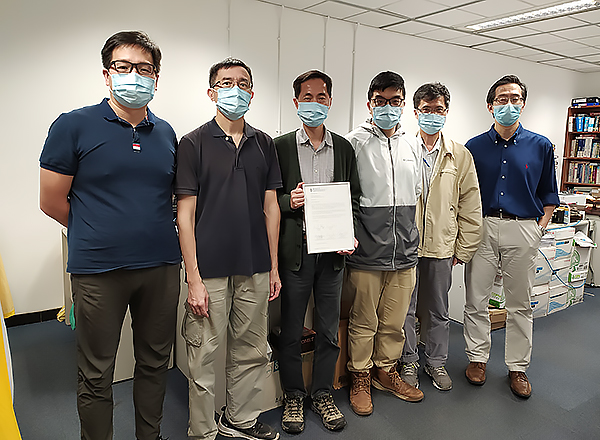
Interviewee: Ms. Liona Cheung Teaching Technologies, Information Technology Services Center (ITSC)
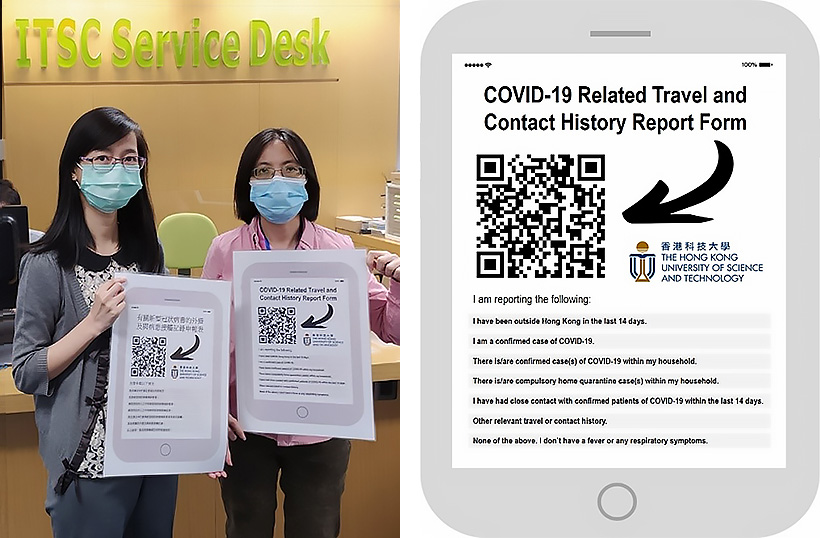
ITSC has always been maintaining the University’s IT infrastructure at the leading edge. The pandemic was a shock but it did not catch the far-sighted team off guard.
“The replacement of routers and improvement of networks were the actions in our medium-term plan anyway. ITSC could foresee the needs but the unprecedented growth in the usage of Zoom and Canvas during the pandemic has actually accelerated the actions. Our Infrastructure Systems and Network System teams managed to maintain the hardware servers and enhance network traffic, and our Central Service Desk was also maintained to support general users, mainly by diverting calls to ITSC colleagues who worked from home,” said Liona.
Because of all ITSC does and leads, along with the efforts of the faculty, teaching staff and School officers, classes are now delivered in “mixed-mode”. While students are enjoying lectures, ITSC is taking care of everything behind the scenes.
She added “Our Director, Dr. Samuel Kwan, has taken the lead in exploring the commercially available solutions to facilitate the delivery of a complete online learning experience using Zoom and Canvas. Our Audio/Visual Technologies and Teaching Technologies teams have been working long and hard to install additional computers, webcams and microphones in classrooms and lecture theaters, and provide user supports to ensure real-time streaming was up and running. These efforts have significantly improved user experience with “mixed-mode” teaching and class discussion whether the users participated in class or online.”
Interviewees: Mr. Gary Cheuk and Mr. Will Li
Application Development & Support, Information Systems Office (ISO)
One unexpected outcome of COVID-19 is that faculty and staff realize the benefits of fast-tracking digital transformation. This dramatic change of mindset has been helpful and ISO managed to roll out a number of IT systems during the pandemic. See ISO news webpage https://iso.ust.hk/news for details.
“In the development of IT systems for central administrative processes, we have to integrate 3 elements, people, processes and technologies. With streamlined processes and change of people’s mindset, technologies help our users to realize automation and operational efficiency. Mobile apps and eforms are some of the quick-win solutions to eliminate repetitive manual processes. In response to the urgent need for enhanced campus access control and efficient distribution of surgical masks, ISO implemented the HKUST Visitor Pre-registration eForm and Mask Distribution Mobile App within a few days. Both solutions are highly user-friendly, not required for any user training or system support, and having high usage volume,” said Gary.
Technologies also help the ISO team to work efficiently and effectively under the working from home arrangement. “Our Director, Mr. Derry Fong, led an internal survey within ISO to find out the change in productivity during the pandemic. The survey results indicated that we experienced a slight drop in productivity when we started to mainly work from home and work in office by rota. Shortly afterwards, most of us managed to maintain output and recover efficiency to normality. We have the IT facilities and are familiar with the digital platforms for our jobs anyway. It only took us a short period of time to switch to working from home,” said Will.
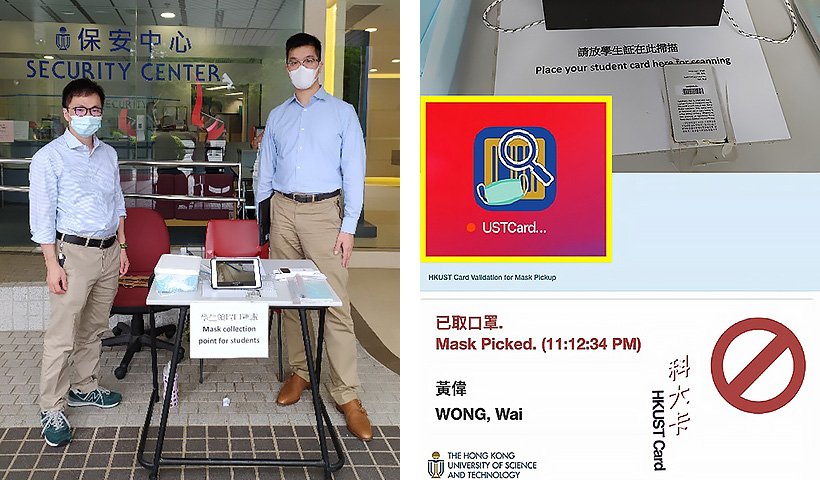
Interviewees: Ms. Vanaie Liu, Christine Au and Whisky Lau, Design & Multimedia, Media Technology & Publishing Center (MTPC)
Ms. Tiffany Tang, Communications & External Affairs, Office of the Dean of Engineering (DENG)
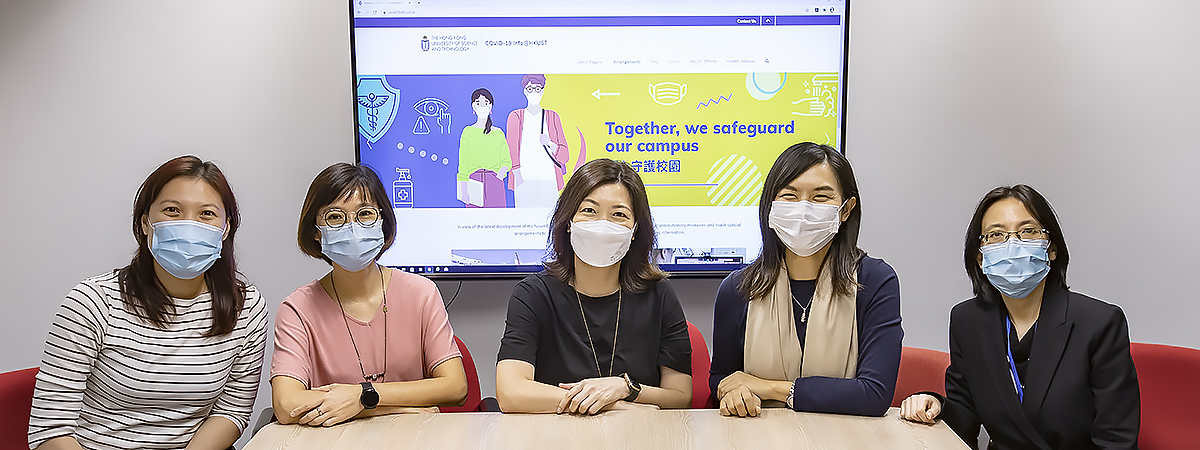
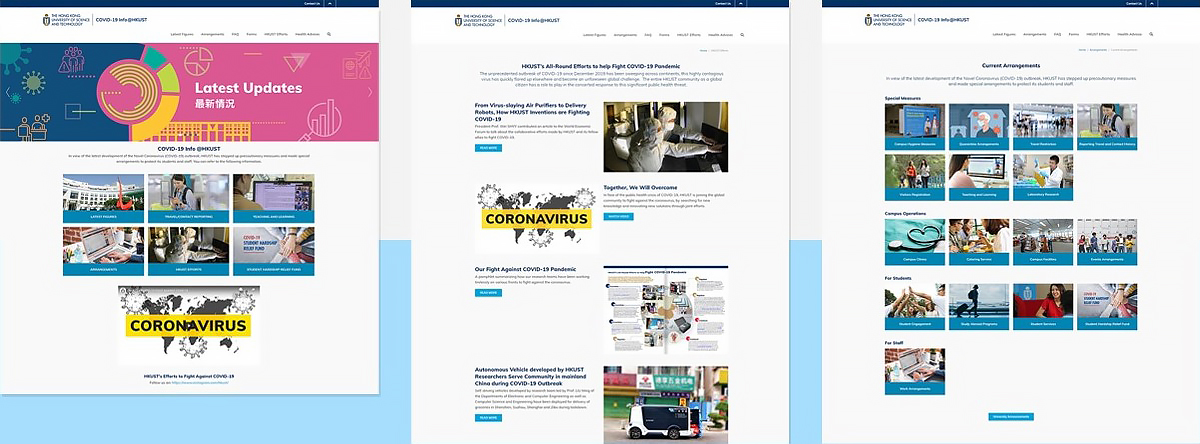
The HKUST COVID-19 info hub https://covid19info.ust.hk was launched in April 2020 to help members of the University to get the latest information relating to COVID-19.
“MTPC has a professional web design team but the challenge of creating the COVID-19 info hub was to complete it in a short period of time. First of all, we collected the contents provided by various departments, including all-member announcements collected by PAO, quarantine arrangements from VPABO, teaching arrangements from the Office of the Provost and school offices, health advice from HSEO, updates on catering outlets from CSO and news on campus facilities from CMO. We had to consolidate the useful contents and tidy them up into a reasonably consistent style for publishing on an enhanced Drupal platform. Building the website also involved design of inspirational graphics and choosing the right pictures or photos for icons,” said Vanaie.
Christine and Whisky added “Despite the urgency, all our works were carried out to be fully compliant with HKUST’s policies and guidelines. A User Acceptance Test (UAT) had to be undertaken for previewing the website to identify any technical issues or making final adjustments in content. Finally the website was migrated to production, which means it could go live. The MTPC team was very pleased to get the entire job well done in 3 weeks.”
“Colleagues and students can visit the COVID-19 info hub to find useful information and answers to frequently asked questions quickly and easily,” said Tiffany who has volunteered to maintain the website since April 2020. “HSEO and I updated the website whenever there was any new information on COVID-19, such as the Government’s Universal Community Testing Programme (UCTP) and requirements to reduce gatherings. We want to make sure that our University community can continue to be well informed to stay safe,” she added.
Interviewees: Mr. Kan, Ms. Ng and Ms. Cheung
Nixon Cleaning Company Limited
Mr. Kan, Ms. Ng and Ms. Cheung, are frontline cleaners who have worked on the HKUST campus for 11, 6 and 2 years respectively. The COVID-19 outbreak has significantly changed the way they perform their works.
“We have to re-arrange our routine cleaning tasks to really ramp up our efforts to go through all the rooms to clean things up and disinfect on a regular basis. For example, on top of daily cleaning with ordinary disinfectants and water, we have to spray Germagic anti-microbial coating on many different surfaces every 90 days. It is a substantial undertaking but we are making it happen. The management has divided us into two teams and allowed staggered work hours and flexible lunch breaks as much as possible,” said Mr. Kan.
“COVID-19 has drastically increased the amount and changed the types of trash we collected. Disposable food containers and plastic bags are booming. We also observed a big rise in tissue paper. Such changes are totally understandable; people pay more attention to their personal hygiene and feed on takeout meals more often. In contrast, the bins designated for disposal of used face masks are usually not full,” said Ms. Ng. Since the University’s policy is in line with the Government’s requirements which impose restriction on the number of persons in group gatherings, the lunch arrangements of the cleaners are affected as a result. “Our team would not be able to use the common room at the same time and some of us need to have lunch at the outdoor areas. It’s inconvenient but we appreciate it is one of the anti-pandemic measures for everyone on campus to follow,” added Ms. Ng.
“Since the COVID-19 outbreak, there has been a huge increase in consumption of hand sanitizers. The members of the University are now more willing to use hand sanitizers more frequently. In the past, the sanitizers in the dispensers hardly ever ran out but, these days, we need to make sure that we refill all the dispensers on campus at least once a day,” said Ms. Cheung.
Mr. Tong and Ms. Chan
Maxim’s Group
Mr. Tong and Ms. Chan work for Maxim's Group, a catering service contractor managed by Campus Services Office (CSO). Maxim’s Group operates 3 on campus restaurants, China Garden, LG1 Canteen II and Diners@LSKBB.
“The impact of COVID-19 on our business is substantial but we are glad that we have overcome many challenges to keep operating. We have to stay up to date with the Government’s changing requirement on the maximum number of persons that may be seated together at a table. Taking China Garden as an example, we have to limit occupancy to less than 50% of the original venue capacity in order to comply with the statutory requirement and accommodate the University’s social distancing guidance. Customers order takeaway meals more often than they used to,” said Mr. Tong.
Ms. Chan added “COVID-19 has significantly changed the way we work. Before the outbreak, our LG1 Canteen offered self-service cutlery but now our staff have to provide a cutlery and paper napkin set to each of the customers so as to mitigate the risk of contamination. All of us working in the kitchen and serving in the dining area must wear a mask. Staff preparing food wash their hands regularly and maintain good hygiene practices in food preparation areas. We clean and disinfect all high-contact surfaces every few hours; these include tables, chairs, door handles, menus, touchscreens of the self-order kiosks, Octopus card readers and food ordering pagers.” Customers also keep a vigilant eye on the hygiene standards of restaurants these days. “Most of our customers have been cooperative and supportive. They are happy to follow the preventive measures adopted in the restaurant for everyone’s benefit,” said Ms. Chan.

